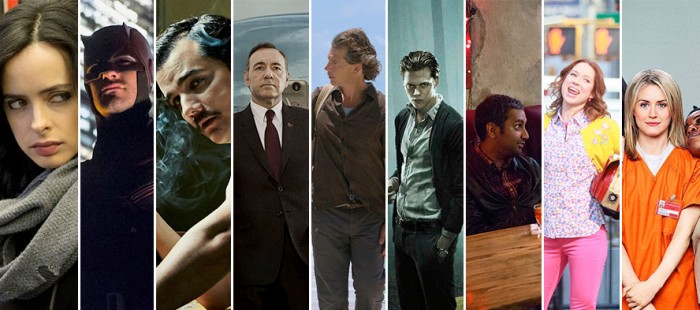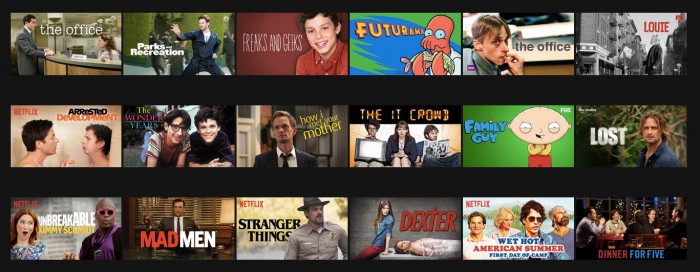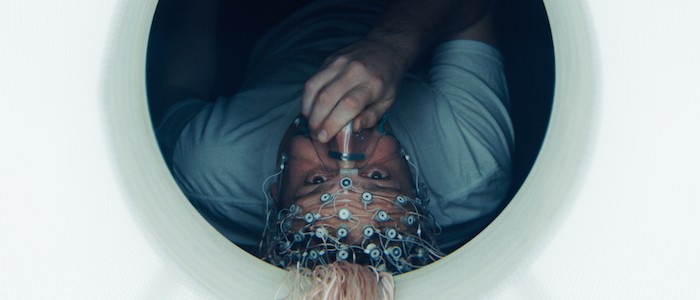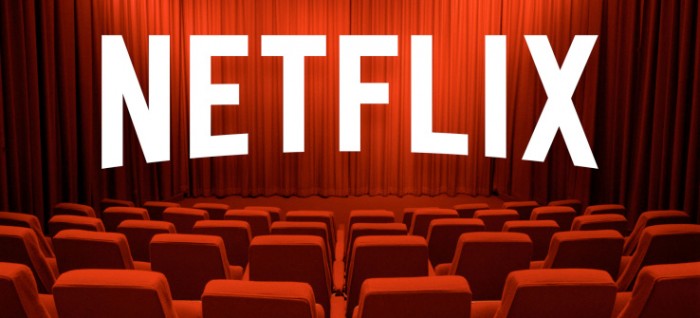Why Netflix Really Bums Me Out Sometimes
(Welcome to The Soapbox, the space where we get loud, feisty, and opinionated about something that makes us very happy...or fills us with indescribable rage. In this edition: why Netflix, for all the good stuff that the streaming service offers, sometimes completely bums us out.)
There's no denying Netflix has been a gamechanger when it comes to bringing entertainment to the masses. Allowing people to rent DVDs by mail was a strong start for the company, but they ended up changing the face of film and television distribution forever when they entered the video streaming arena.
At first, Netflix was only giving their subscribers movies and TV shows from established studios and networks, but eventually, they started creating their own programming. It took them a little while to find their footing, but they came into their own in 2015, doubled their amount of original programming in 2016, and they have their sights set on having 50% of their library be original content in the next few years.
But as the streaming service has increased their output of original content, I find myself being really bummed out by Netflix sometimes. Indulge me, if you will, as I run through a couple of my problems with Netflix's current path.
Yes, Netflix Is Doing Great Things for Entertainment
First, let me just say that Netflix deserves endless praise for financing and distributing movies and TV shows that otherwise would have received a much smaller audience, or may never have been made at all.
While successful shows like House of Cards and Orange is the New Black might have found a home on a pay cable network, shows like Sense8, The Crown, The Get Down, Lady Dynamite or the Santa Clarita Diet might have had a harder time finding a place that would take a chance on projects with such a niche audience. The same can be said for all the movies that Netflix has been picking up at film festivals, like The Fundamentals of Caring, I Don't Feel at Home in This World Anymore, Pee-Wee's Big Holiday and the upcoming sci-fi indie The Discovery.
Netflix has even saved some shows from the grave. Arrested Development wouldn't have come back without the streaming service taking a chance on reviving a series that had an established fanbase. Unbreakable Kimmy Schmidt is an example of a show that was developed for network television, only to be abandoned by the network that ordered it, and Netflix picked it up, saved it, and delivered a great show. Plus, revivals like Fuller House and Gilmore Girls are made possible because Netflix is willing to tap into existing fanbases to give them what they want.
When it comes down to it, there are countless titles in film and TV that can be watched by the millions of Netflix subscribers out there. In most cases, this gets lesser advertised movies and TV shows in front of many more eyes than studios and networks would be willing to spend the money to reach. It's nice to know that Netflix has the money to take bigger risks on movies and TV shows that the rest of Hollywood won't take a chance on.
But that doesn't mean it doesn't come with some baggage.
The Downside of Binging Television on Netflix
As Buffy the Vampire Slayer celebrated its 20th anniversary recently, creator and director Joss Whedon has been making some rounds for interviews to talk about the legacy of the series. In one of the interviews, he lamented the culture of binge watching that Netflix has created.
When Netflix releases a new show, they don't release a new episode each week like cable and network channels. Instead, they dump a whole season online for audiences to watch at their leisure. For some viewers, this has been great, because they don't have to wait to find out what happens next. But for Joss Whedon, he misses the experience of having an audience experience a show together, and he has expressed hesitation in making a show for the streaming service for that very reason. Whedon says:
"I would not want to do it. I would want people to come back every week and have the experience of watching something at the same time. We released Doctor Horrible in three acts. We did that, in part, because I grew up watching miniseries like Lonesome Dove. I loved event television. And as it was falling by the wayside, I thought, 'Let's do it on the internet!' Over the course of that week, the conversation about the show changed and changed. That was exciting to watch."
So while Netflix has all this money to spend on whatever TV shows they want (and Joss Whedon says he wouldn't turn down a bunch of money if Netflix wanted to make his dream project, whatever that may be), audiences don't experience them like they used to, and that can be really frustrating, not just for creators, but for viewers too.
One of my favorite experiences in watching television on a weekly basis was absorbing all six seasons of the ABC series Lost as they unfolded week after week, year after year. The time between episodes gave them time to simmer, and it allowed fans to theorize about what every detail meant in the grand scheme of things. Clearly this level of scrutiny isn't something that is required of all TV shows, but in the case of something like Netflix's Stranger Things, I missed the opportunity normally afforded by a more traditional distribution format to absorb every detail together with a passionate fanbase.
My experience with Lost was recently revived by way of HBO's series adaptation of Westworld. Each week a new episode debuted, and the time between them allowed endless conversation (including plenty from our own Jacob Hall, not to mention our podcast Decoding Westworld) about the significance of details that we only have the time to properly scrutinize and talk about when we don't have the rest of the season just sitting there, waiting for us to watch it.
Netflix isn't solely to blame for the absence of unifying discussion about TV shows since the DVR was changing how we watch TV long before Netflix became a streaming giant. But still, the problem is that we're barely watching shows together anymore, and not only is there no sense of community when it comes to discussing these shows, but the window for any discussion has become so small that it makes it hard to effectively engage with each other about them. More and more, we're missing that sense of community that can arise between millions of us, all from the entertainment we consume. That's something that I genuinely miss as we all choose to watch Netflix shows at our own pace.
The Downside of Original Movies on Netflix
When it comes to movies, the problem isn't quite the same as it is with television. As I indicated earlier, Netflix is doing a great thing by picking up financing and distributing movies that otherwise would fall to the wayside and be seen by far fewer people. However, it's how viewers must watch these movies that bums me out a bit.
Movies are made to be seen on the big screen. Sure, there are millions who won't see a given movie for the first time until it's on home video or even playing on television. But at least most of the time, viewers have the opportunity to see a new release on the big screen if they so choose. As it stands, Netflix's original movies will mostly only ever be seen on a television (or worse, a tablet), missing out on the opportunity to be seen in a theater.
Sure, there are some Netflix original movies that get a limited theatrical release day and date when they hit Netflix (there's one coming up for Bong Joon-ho's new movie Okja . In fact, the streaming service struck a deal last fall with the iPic Entertainment theater chain to have 10 of their original movies screened at locations in Los Angeles and New York City, with the additional option of being screened at some of their other locations. But those opportunities are so few and far between that they might as well not happen at all for most audiences.
Netflix's stance on this issue is a complicated one, because CEO Ted Sarandos indicated they struck this theatrical deal as a way of washing away the stigma that movies that go straight to Netflix are somehow lower in quality than those released in theaters, like movies that go straight to DVD or VOD. At the same time, Sarandos thinks the idea of a movie being considered more legitimate because it's on the big screen is on its way out. I really wish it wasn't.
My concern isn't about legitimacy so much as missing out on the big screen experience. It might seem like some, if not most, of Netflix's movies need to be seen in a movie theater. Personally, I think every movie deserves the chance to be seen on the big screen, where people won't be distracted by their everyday life. But the availability of Netflix movies in theaters makes that rather difficult for people who don't regularly attend film festivals. If I wasn't afforded the chance to see The Discovery (pictured above) on the big screen at Sundance, I would have lamented the fact that I wasn't able to see it in theaters.
Furthermore, it seems like Netflix is starting to venture into larger scale movie territory, which makes a lack of theatrical screening opportunities all the more disappointing. For example, Bright is a movie starring Will Smith and directed by Suicide Squad helmer David Ayer about a police officer who teams up with an Orc cop in a world of both human and mythical creatures. That sounds like a movie I want to see on the big screen for sure, and the first look pictures have indicated that this is quite an ambitious high concept movie that seems worthy of a theatrical release. While there's a chance Bright could end up with one of those limited theatrical releases, that doesn't seem like enough.
With Netflix becoming a bigger player in the feature film world, it's depressing that some of their movies will essentially never be seen in theaters and in front of packed audiences. As viewers, there are some movies we won't get to see with a big crowd and feel how each other reacts to something hilarious, shocking, terrifying or heartbreaking. That's a pivotal part of the movie-going experience that can be lost with Netflix movies that are only watched at home by ourselves or with a small group of friends.
Is There a Solution?
I'm not sure if these issues I have with Netflix can be resolved. On the TV side of things, it would likely take someone like the creator or executive producer of a show to make an extreme push for a show to be released weekly instead having all the episodes available online at once. Even then, I'm not sure Netflix would be willing to make a departure from their successful binging model.
On the movie front, Netflix could choose to release more of their movies theatrically day and date with the streaming release. But they've already faced complaints and even boycotts from theater chains for such plans. They just don't like the idea of a movie being available at the same time at home, potentially taking away some of the profits they would receive from having viewers come into their theaters instead.
Another solution would be to start releasing movies in theaters first for a period of a month or so before making the movie available on Netflix. That seems like a solution that would make everyone happy, as long as the movie is made available in wide release and theaters have ample time to get box office (or more importantly concession) money in their pockets.
One thing I'd like to see happen is just to have Netflix open up their own theaters. Rather than striking deals with other theater chains, they could have a series of theaters opened in maybe 20 major cities across the country that will play only Netflix movies. They could even still follow the aforementioned proposed release model of having a Netflix original movie in theaters for a month before putting it on streaming. This way, viewers can choose whether they want to see a given movie on the big screen or wait to see it in the comfort of their home.
Going back to the television side of things, if Netflix did have their own theaters, they could even start to make events out of the release of their TV shows. How cool would it be to watch the first two or three episodes of the second season of Stranger Things or the first couple episodes of The Defenders in a movie theater? This is nothing more than a pipe dream, since I'm sure the overhead cost for Netflix would discourage them immediately from taking on an endeavor like this.
***
While I have these quibbles with Netflix, this isn't necessarily how a majority of viewers feel. I'm sure plenty of Netflix subscribers are just fine if they never see any of the streaming services original movies in a theater. Just as many of them would be pretty pissed off if Netflix didn't let them binge new episodes of shows they've waited months to see return. This is just one man's perspective and opinion on these new directions that Netflix is taking the distribution model of film and television. It's a landscape that will continue to change in the years to come, and I'm thoroughly interested in seeing how it evolves.
If you have any thoughts on the matter, feel free to sound off below.




